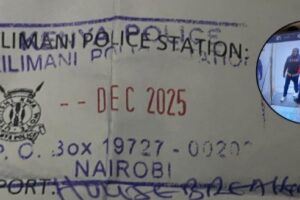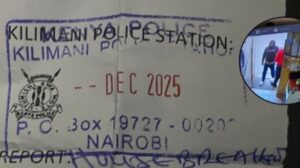Gideon Kibet, known online as ‘Kibet Bull,’ is a visual activist and cartoonist from Kenya.
He became popular for his unique silhouette caricatures, often shared on social media platforms.
In December 2024, Kibet was reportedly abducted by individuals suspected to be state agents.
This incident occurred shortly after he met with Busia Senator Okiya Omtatah in Nairobi. Following his disappearance, there was widespread concern among his family, friends, and the online community.
Many feared for his safety, especially considering the increasing reports of abductions targeting activists and critics in the country.
Kibet’s family, particularly his mother, made public pleas for his release, expressing deep distress over the situation.
On January 6, 2025, Kibet announced his release through a post on the social media platform X (formerly Twitter).
He revealed that he was dropped off in Luanda Town, Vihiga County, between 3 and 4 a.m.
Unsure of his surroundings and with limited options at that hour, he spent some time at a local ‘disco matanga,’ an overnight funeral dance common in the region.
Later, he managed to secure a bus ticket to return home.
Kibet’s release coincided with the reappearance of four other young men who had also been reported missing.


Among them was his brother, Rony Kiplang’at, who was found alive in Machakos County.
The simultaneous release of these individuals has raised questions about the motives behind their abductions and the identities of those responsible.
The Kenyan government has faced increasing pressure to address the rising number of abductions and enforced disappearances.
Human rights organizations have documented numerous cases, urging authorities to take decisive action.
In response, President William Ruto directed the National Police Service to investigate these incidents and provide answers to the affected families.
Despite these directives, the identities and motives of the abductors remain unclear.
The government’s denial of involvement has led to speculation and accusations among political leaders, further complicating the situation.
Some have accused political rivals of orchestrating the disappearances to gain public sympathy, though concrete evidence supporting these claims is lacking.
Kibet’s safe return has brought relief to his family and supporters.
However, the circumstances surrounding his abduction and release highlight the broader issue of enforced disappearances in Kenya.
Human rights organizations continue to call for greater accountability and transparency from security forces and political leaders to prevent such incidents in the future.
As of now, Kibet has not provided detailed information about his captivity or the identities of his abductors.
The lack of clarity continues to fuel public concern and debate over the safety of activists and the state of human rights in the country.
The situation underscores the need for comprehensive investigations to ensure the protection of citizens’ rights and freedoms.





















Add Comment